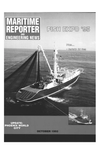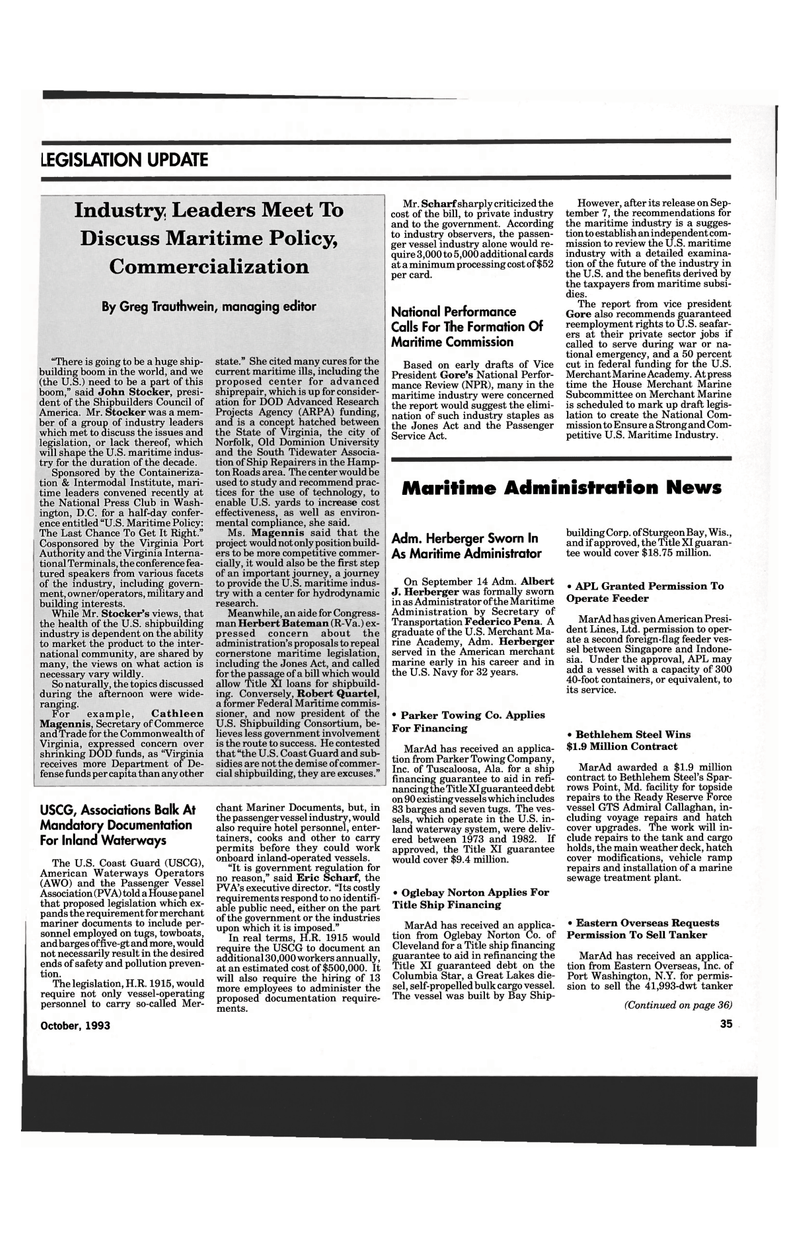
Page 33: of Maritime Reporter Magazine (October 1993)
Read this page in Pdf, Flash or Html5 edition of October 1993 Maritime Reporter Magazine
LEGISLATION UPDATE
Industry Leaders Meet To
Discuss Maritime Policy,
Commercialization
By Greg Trauthwein, managing editor "There is going to be a huge ship- building boom in the world, and we (the U.S.) need to be a part of this boom," said John Stocker, presi- dent of the Shipbuilders Council of
America. Mr. Stocker was a mem- ber of a group of industry leaders which met to discuss the issues and legislation, or lack thereof, which will shape the U.S. maritime indus- try for the duration of the decade.
Sponsored by the Containeriza- tion & Intermodal Institute, mari- time leaders convened recently at the National Press Club in Wash- ington, D.C. for a half-day confer- ence entitled "U.S. Maritime Policy:
The Last Chance To Get It Right."
Cosponsored by the Virginia Port
Authority and the Virginia Interna- tional Terminals, the conference fea- tured speakers from various facets of the industry, including govern- ment, owner/operators, military and building interests.
While Mr. Stocker's views, that the health of the U.S. shipbuilding industry is dependent on the ability to market the product to the inter- national community, are shared by many, the views on what action is necessary vary wildly.
So naturally, the topics discussed during the afternoon were wide- ranging.
For example, Cathleen
Magennis, Secretary of Commerce and Trade for the Commonwealth of
Virginia, expressed concern over shrinking DOD funds, as 'Virginia receives more Department of De- fense funds per capita than any other
USCG, Associations Balk At
Mandatory Documentation
For Inland Waterways
The U.S. Coast Guard (USCG),
American Waterways Operators (AWO) and the Passenger Vessel
Association (PVA) told a House panel that proposed legislation which ex- pands the requirement for merchant mariner documents to include per- sonnel employed on tugs, towboats, and barges of five-gt and more, would not necessarily result in the desired ends of safety and pollution preven- tion.
The legislation, H.R. 1915, would require not only vessel-operating personnel to carry so-called Mer-
October, 1993 35 state." She cited many cures for the current maritime ills, including the proposed center for advanced shiprepair, which is up for consider- ation for DOD Advanced Research
Projects Agency (ARPA) funding, and is a concept hatched between the State of Virginia, the city of
Norfolk, Old Dominion University and the South Tidewater Associa- tion of Ship Repairers in the Hamp- ton Roads area. The center would be used to study and recommend prac- tices for the use of technology, to enable U.S. yards to increase cost effectiveness, as well as environ- mental compliance, she said.
Ms. Magennis said that the project wouldnotonlypositionbuild- ers to be more competitive commer- cially, it would also be the first step of an important journey, a journey to provide the U.S. maritime indus- try with a center for hydrodynamic research.
Meanwhile, an aide for Congress- man Herbert Bateman (R-Va.) ex- pressed concern about the administration's proposals to repeal cornerstone maritime legislation, including the Jones Act, and called for the passage of a bill which would allow Title XI loans for shipbuild- ing. Conversely, Robert Quartel, a former Federal Maritime commis- sioner, and now president of the
U.S. Shipbuilding Consortium, be- lieves less government involvement is the route to success. He contested that "the U.S. Coast Guard and sub- sidies are not the demise of commer- cial shipbuilding, they are excuses." chant Mariner Documents, but, in the passenger vessel industry, would also require hotel personnel, enter- tainers, cooks and other to carry permits before they could work onboard inland-operated vessels. "It is government regulation for no reason," said Eric Scharf, the
PVA's executive director. "Its costly requirements respond to no identifi- able public need, either on the part of the government or the industries upon which it is imposed."
In real terms, H.R. 1915 would require the USCG to document an additional 30,000 workers annually, at an estimated cost of $500,000. It will also require the hiring of 13 more employees to administer the proposed documentation require- ments.
Mr. Scharf sharply criticized the cost of the bill, to private industry and to the government. According to industry observers, the passen- ger vessel industry alone would re- quire 3,000 to 5,000 additional cards at a minimum processing cost of $52 per card.
National Performance
Calls For The Formation Of
Maritime Commission
Based on early drafts of Vice
President Gore's National Perfor- mance Review (NPR), many in the maritime industry were concerned the report would suggest the elimi- nation of such industry staples as the Jones Act and the Passenger
Service Act.
Adm. Herberger Sworn In
As Maritime Administrator
On September 14 Adm. Albert
J. Herberger was formally sworn in as Administrator of the Maritime
Administration by Secretary of
Transportation Federico Pena. A graduate of the U.S. Merchant Ma- rine Academy, Adm. Herberger served in the American merchant marine early in his career and in the U.S. Navy for 32 years. • Parker Towing Co. Applies
For Financing
MarAd has received an applica- tion from Parker Towing Company,
Inc. of Tuscaloosa, Ala. for a ship financing guarantee to aid in refi- nancing the Title XI guaranteed debt on 90 existing vessels which includes 83 barges and seven tugs. The ves- sels, which operate in the U.S. in- land waterway system, were deliv- ered between 1973 and 1982. If approved, the Title XI guarantee would cover $9.4 million. • Oglebay Norton Applies For
Title Ship Financing
MarAd has received an applica- tion from Oglebay Norton Co. of
Cleveland for a Title ship financing guarantee to aid in refinancing the
Title XI guaranteed debt on the
Columbia Star, a Great Lakes die- sel, self-propelled bulk cargo vessel.
The vessel was built by Bay Ship-
However, after its release on Sep- tember 7, the recommendations for the maritime industry is a sugges- tion to establish an independent com- mission to review the U.S. maritime industry with a detailed examina- tion of the future of the industry in the U.S. and the benefits derived by the taxpayers from maritime subsi- dies.
The report from vice president
Gore also recommends guaranteed reemployment rights to U.S. seafar- ers at their private sector jobs if called to serve during war or na- tional emergency, and a 50 percent cut in federal funding for the U.S.
Merchant Marine Academy. At press time the House Merchant Marine
Subcommittee on Merchant Marine is scheduled to mark up draft legis- lation to create the National Com- mission to Ensure a Strong and Com- petitive U.S. Maritime Industry. building Corp. of Sturgeon Bay, Wis., and if approved, the Title XI guaran- tee would cover $18.75 million. • APL Granted Permission To
Operate Feeder
MarAd has given American Presi- dent Lines, Ltd. permission to oper- ate a second foreign-flag feeder ves- sel between Singapore and Indone- sia. Under the approval, APL may add a vessel with a capacity of 300 40-foot containers, or equivalent, to its service. • Bethlehem Steel Wins $1.9 Million Contract
MarAd awarded a $1.9 million contract to Bethlehem Steel's Spar- rows Point, Md. facility for topside repairs to the Ready Reserve Force vessel GTS Admiral Callaghan, in- cluding voyage repairs and hatch cover upgrades. The work will in- clude repairs to the tank and cargo holds, the main weather deck, hatch cover modifications, vehicle ramp repairs and installation of a marine sewage treatment plant. • Eastern Overseas Requests
Permission To Sell Tanker
MarAd has received an applica- tion from Eastern Overseas, Inc. of
Port Washington, N.Y. for permis- sion to sell the 41,993-dwt tanker (Continued on page 36) 35
Maritime Administration News

 32
32

 34
34
